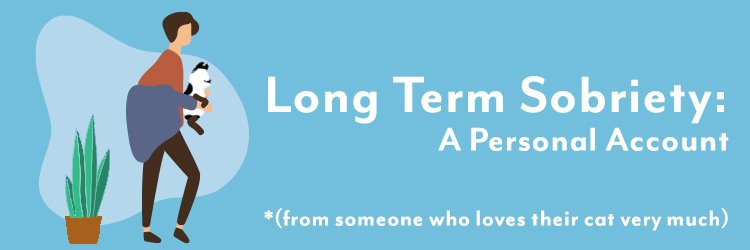[vc_row][vc_column][vc_column_text]
*(This isn’t about my cat. I just love him very much, so our graphic designer Madeleine drew pictures of us together.)
 Before I got sober (the time that stuck), I worried I would be bored without alcohol or drugs. Then I got caught up in the newness of sobriety. It seemed like every week, I was noticing changes in both my physical health and the way I related to the world. I was constantly excited to see what else would happen.
Before I got sober (the time that stuck), I worried I would be bored without alcohol or drugs. Then I got caught up in the newness of sobriety. It seemed like every week, I was noticing changes in both my physical health and the way I related to the world. I was constantly excited to see what else would happen.
As the first year wrapped up, my nervousness about boredom changed track; I worried things would level out, creating a new kind of sober-tedium. Novelty was one thing—the mundanity of everyday life was another.
At a year sober, I was still very much learning to manage my emotions. Having spent my adult life up to the year before abusing alcohol and substances, I’d never learned to sit in discomfort, or to cope with difficult feelings in a healthy way. It took time, work and practice—all of which started once I removed substances.
When you’ve stayed sober a year, you’ve probably been through a wide range of typical human experiences. When I was seven months sober, someone very close to me died. On top of my grief, it was a challenge to face the seemingly unbearable emotions head-on. Over the years since then, several people close to me have died or received a cancer diagnosis. Grief never gets easier, but facing it without alcohol or drugs does. This is a skill; skills take practice. Put simply, I see long-term sobriety as repeated practice at life.
I am a goal-oriented person, so I have found it helpful to take note of my progress as time goes on. A therapist can help with this. If you feel stuck, they can point out big changes you’ve already made in your worldview, reminding you change is possible. Journaling also helps; it’s an easy way to track what you were thinking at a given time.
Long-term sobriety—like anything else—can be mundane sometimes. Nothing is going to stay exciting every moment, especially as you do it for years and years. Life also gets busy. This is why I constantly make note of changes in my life. It’s a way to remind myself how much better my life has gotten in all ways. It also makes me excited for the future.
What I thought might get boring never truly did. In some ways, it has gotten more interesting. Even in its monotony—and even when my active addiction days feel long enough ago that I can romanticize them—long-term sobriety continues to be an incredible experience. The changes I used to recognize from week to week may be slower now, and arguably more subtle, but they are deeper.
At TruHealing Centers across the country, we offer a full continuum of care for substance abuse and co-occurring disorders, including relapse prevention and aftercare planning. We will set you up with support groups and a long-term recovery plan to help you make lasting change. You deserve to experience the incredible effects of long-term sobriety; we will help you get there. [/vc_column_text][/vc_column][/vc_row]









